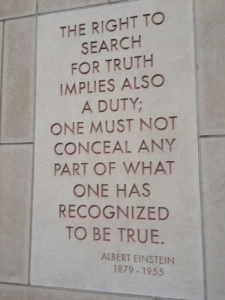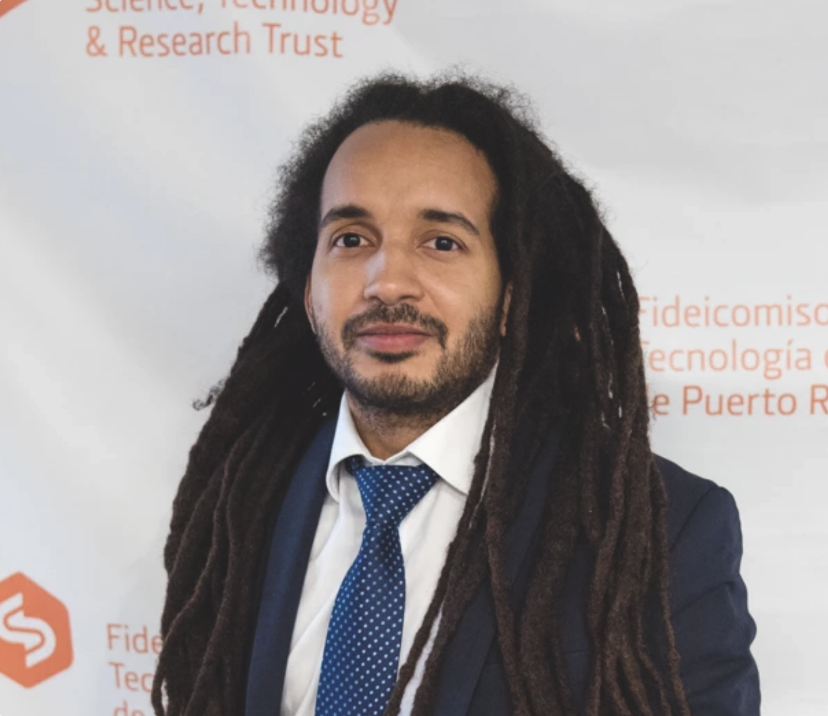Dr. Tessa Hill is an Associate Professor at University of California, Davis studying ocean biogeochemistry. She is a AAAS Public Engagement Fellow and teaches courses on oceanography, climate science and science communication. This post was originally published on Medium on March 9, 2016. It is re-posted here with the permission of the author.
I recently offered a course at UC Davis on Science Communication (specifically targeting Ocean, Climate, and Environmental Science) with a genuinely exceptional group of graduate students. During the course, we hosted eight outside experts working in communications, policy, and media to chat with our class. We also read an excellent book, used available online resources (this, and this for example), pored over several examples of great #SciComm, practiced mock interviews and policy briefings, and even recorded our own in-class podcast. When I look back at recurrent themes and advice, what just kept popping to the surface? Read on.

Inscription on the wall of the National Academies Keck building, Washington, D.C. Photo courtesy of Dr. Tessa Hill.
Know your audience….
Just as not all ‘scientists’ are the same, ‘the media’ or ‘the public’ are terms that oversimplify the task at hand. Good communicators learn ahead of time who they will be speaking to, what they are interested in learning, and consider how to best reach that particular group or person.
….and hone your message
Use a message box to boil your science down to the most important points, or try writing down three bullet points about your work so that you are ready when the phone rings. Spending some time thinking about the main points of your work can also help you avoid jargon.
I use these same techniques when I am preparing to write a scientific paper, drafting a lecture, or getting ready for interviews — each time with a different audience in mind — so get used to doing them over and over again, which brings me to the next point…
“There is nothing better for your #SciComm skills than learning from your own mistakes”
Practice Practice Practice
There is nothing better for your #SciComm skills than learning from your own mistakes. Be open to being interviewed and giving public talks, because each opportunity provides you a chance to practice your skills and improve for the next time. There may be opportunities to practice your skills that are hiding in plain sight: offer to give a guest lecture to a “general education” course (for non scientists) or visit your own kid’s classroom. You’ll be surprised at how many of these skills are transferrable (your next science talk at a conference may be better for it).
Practicing also gives you an opportunity to try out metaphors and descriptive language about your work. One great way to discover whether a metaphor or description ‘clicks’ is to use it with several different types of audiences and study the results (you are a scientist, after all).
There are challenges & consequences for scientists who communicate
Communicating with people outside of your scientific community can feel quite uncomfortable. Most scientists are not doing this because they love the attention or enjoy being in the public eye — instead, many feel that it is part of the privilege and responsibility of being a scientist. The next time your colleague down the hall gives an interview or a public lecture, remember that the words they used were not directed at the scientific community, but rather at other people, and that they may be just practicing the hard work of communicating science (see above). Provide any support you can!
Use positive messages and consider policy implications
We heard from several sources (see examples here, and here) that when talking about science that has policy relevance, it is effective to weave in some positive actions or ‘levers to pull’. This may be as simple as remembering to state “we have choices to make, and science can inform those choices”. If you think your work has direct policy relevance, be sure you involve decision makers, managers, and/or policymakers early on in the design of your research.
“People want to hear stories about people”
And finally, be your whole self
Are you passionate about the environment, a science geek since childhood, a surfer, a parent, a musician? Some combination? As one communications expert told us, “people want to hear stories about people”. Providing your audience a window into who you are as a scientist doesn’t have to diminish your stature as an ‘expert’. In a way that feels professional and honest to you, consider telling people what inspires you to be a scientist, what keeps you up at night, and why what you are doing is exciting — it is a point of connection that will allow your science to be heard even more clearly.



